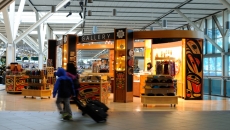Environment Minister Jonathan Wilkinson is scaling back the government's planned Clean Fuel Standard in the short term to give the fossil fuel industry a bit more time to recover from the pandemic-induced economic collapse.
But to make up for less stringent emissions reductions in the beginning, he said fuel producers will have to do more to green up their gasoline and diesel fuels starting in 2026.
"We think that's appropriate in the context of the current environment where firms are having to come through a very difficult time," Wilkinson told The Canadian Press in an interview.
The overall effect, said Wilkinson, will not reduce the impact the standard is to have by the time it is fully rolled out in 2030.
With demand for oil in particular down sharply amid the COVID-19 economic slowdown, and market prices plummeting to record lows in April because of a production war between Russia and Saudi Arabia, Canada's fossil fuel sector is in rough financial shape, making it difficult, if not impossible, to make the kind of investments needed to meet the new fuel standards.
At the end of March, the Canadian Association of Petroleum Producers asked the government to put off the Clean Fuel Standard entirely by three years, pushing the start date back from 2022 to 2025 for liquid fuels like gasoline and diesel, and from 2023 to 2026 for gaseous fuels like propane.
Wilkinson said he understands the need to be a bit flexible, but "climate change is not going away" so weakening the standard overall was not a consideration. Acknowledging that companies needed a bit more time to make the investments and actually build the infrastructure or install the technology needed to comply with the new standards is a good compromise, he said.
The Clean Fuel Standard, first announced in 2016 as part of the Pan-Canadian Framework on Clean Growth and Climate Change, requires fuel companies to reduce the carbon intensity of their products. Specifically that means cutting down the amount of carbon dioxide that is produced when fuels like gasoline, diesel, propane or kerosene are burned to run vehicles, furnaces and machinery.
The Clean Fuel Standard originally proposed that the intensity of gasoline be reduced by four per cent starting in 2022, and by 11 per cent in 2030. The new proposal reduces the first cut to 2.6 per cent in 2022, but then by 2030, companies will have to reduce the emissions intensity by 13 per cent.
Diesel, kerosene, and light and heavy fuel oils are also covered by the first phase of the standard. Gaseous and solid fuels like propane, natural gas, coal and petroleum coke will be addressed in later phases.
Bora Plumptre, a senior analyst at the Pembina Institute, said he is still fully assessing the proposed changes but that overall he doesn't think the change will have a negative impact on the final outcome of the standard.
The standard is one of the single biggest emissions-cutting exercises in Canada's climate plan, aiming to cut 30 million tonnes of annual greenhouse gas emissions by 2030. That amounts to about one-seventh of the total emissions Canada needs to eliminate by then, to hit its targets under the Paris climate agreement.
Companies can meet the new standards in a variety of ways, including direct reductions by blending fuels with biodiesel or ethanol, or indirectly, by finding other places to cut emissions as an offset. That could include, for example, reducing emissions from a production facility or a refinery by replacing fossil-fuel generators with renewable energy versions. Or it could include investing in renewable energy somewhere else, building a biodiesel plant, or installing electric car infrastructure.
Wilkinson was to have published the original regulations this spring but because of the pandemic delayed that until the fall. Public consultations required after publication were impossible during the pandemic shutdowns, he said in April.
Despite delays in the regulations, the goal remains to have the first reductions under the standard kick in by the end of 2022.





